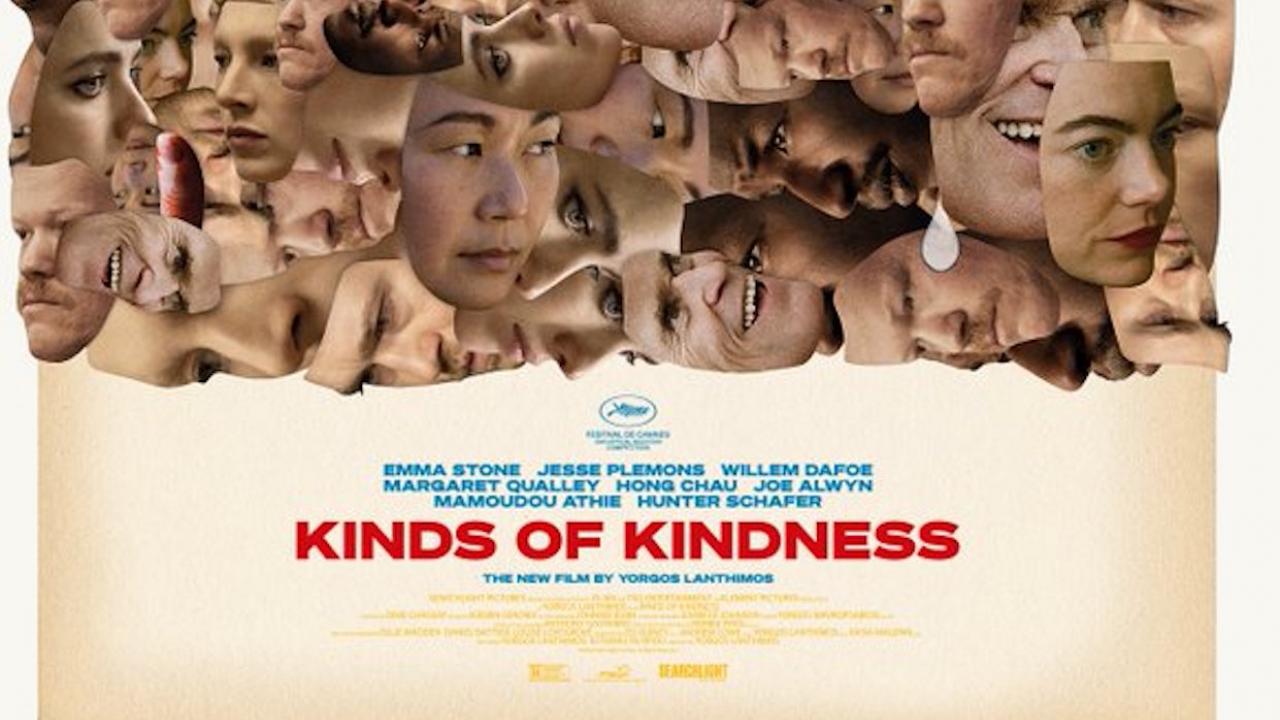Unveiling the Creative Genius: A Deep Dive into the Life and Career of Acclaimed Director Yorgos Lanthimos
Yorgos Lanthimos, the enigmatic and visionary Greek filmmaker, has captivated audiences worldwide with his distinctive cinematic style and thought-provoking narratives. A deep dive into his life and career reveals the depth of his artistic talent and the profound impact he has made on contemporary cinema.
Importance and Impact of Yorgos Lanthimos' Work:
Read also:Unforgettable Melodies John Rzezniks Enduring Musical Genius
- Lanthimos' films challenge societal norms and explore the complexities of human behavior, often through the lens of dark comedy and surrealism.
- His unique storytelling techniques and unconventional characters have influenced a new generation of filmmakers and expanded the boundaries of cinematic expression.
- Lanthimos' films have garnered critical acclaim and prestigious awards, including the Palme d'Or at the Cannes Film Festival, showcasing his exceptional talent and global recognition.
Personal Details and Biography of Yorgos Lanthimos:
| Name | Birthdate | Birthplace |
|---|---|---|
| Yorgos Lanthimos | May 27, 1973 | Athens, Greece |
Evolution of Yorgos Lanthimos' Career:
- Early Films (2005-2010): Lanthimos gained international recognition with his debut feature, "Kinetta," and established his signature style with "Dogtooth" and "Alps."
- International Breakthrough (2011-2017): "The Lobster" and "The Killing of a Sacred Deer" propelled Lanthimos to global stardom, earning him critical acclaim and awards.
- Hollywood Debut and Recent Work (2018-Present): Lanthimos made his Hollywood debut with "The Favourite" and has since directed "The Souvenir" and its sequel.
Yorgos Lanthimos
Yorgos Lanthimos, the visionary Greek filmmaker, has captivated audiences with his distinctive cinematic style and thought-provoking narratives. A deep dive into his life and career unveils seven key aspects that define his unique approach to filmmaking:
- Surrealism
- Dark Comedy
- Unconventional Characters
- Challenging Societal Norms
- International Recognition
- Cannes Palme d'Or
- Global Impact
Lanthimos' films are characterized by a surrealist aesthetic, often juxtaposing mundane reality with bizarre and unsettling elements. His dark comedies explore the complexities of human behavior, exposing the absurdity and cruelty that can lurk beneath the surface. Lanthimos creates unconventional characters, outsiders who challenge societal norms and force audiences to confront their own biases and assumptions.
Lanthimos' work has gained international recognition, with his films screened at prestigious film festivals worldwide. His Palme d'Or win at the Cannes Film Festival is a testament to his exceptional talent and the global impact of his cinematic vision.
1. Surrealism in the Cinema of Yorgos Lanthimos
Surrealism, an artistic movement that emerged in the early 20th century, has had a profound influence on the cinematic style of Yorgos Lanthimos. Surrealism is characterized by the juxtaposition of incongruous elements, the exploration of the subconscious, and the rejection of traditional narrative structures. Lanthimos incorporates surrealist techniques into his films to create a sense of unease and alienation, and to explore the darker recesses of the human psyche.
Read also:Alfonso Ribeiro Net A Dive Into His Life And Career
- The Juxtaposition of the Mundane and the Bizarre: Lanthimos' films often juxtapose everyday objects and events with strange and unexpected elements, creating a sense of disorientation and unease. For example, in "Dogtooth," a family lives in a secluded home where the children are taught that the world outside is dangerous and that all other people are "cats." This juxtaposition of the mundane (family life) with the bizarre (the children's beliefs) creates a sense of tension and absurdity.
- The Exploration of the Subconscious: Lanthimos' films often explore the subconscious minds of his characters, revealing their hidden desires and fears. In "The Lobster," single people are sent to a hotel where they are given 45 days to find a romantic partner. If they fail, they are transformed into an animal of their choice. This film explores the subconscious fears of loneliness and isolation, and the lengths people will go to avoid them.
- The Rejection of Traditional Narrative Structures: Lanthimos' films often reject traditional narrative structures, creating a sense of fragmentation and disorientation. In "Alps," a group of people impersonate the deceased loved ones of grieving families. This film explores the themes of loss and grief, and the ways in which people cope with the death of a loved one.
Lanthimos' use of surrealism creates a unique and unsettling cinematic experience. His films challenge our assumptions about reality and force us to confront the darker aspects of human nature. Surrealism is an essential element of Lanthimos' cinematic style, and it is one of the things that makes his films so distinctive and memorable.
2. Dark Comedy in the Cinema of Yorgos Lanthimos
Yorgos Lanthimos has gained recognition for his unique brand of dark comedy, a genre that combines elements of humor and tragedy to explore the darker aspects of human nature. His films often feature deadpan delivery, awkward social interactions, and absurd situations, creating a sense of unease and discomfort that is both unsettling and strangely humorous.
- The Absurdity of Life: Lanthimos' films often highlight the absurdity of everyday life, exposing the irrationality and meaninglessness that can underlie our most mundane actions. In "Dogtooth," for example, a family lives in isolation, and the children are taught a bizarre set of rules and beliefs that have no basis in reality. This creates a sense of alienation and disorientation, and forces the audience to question the arbitrary nature of our own social norms.
- The Fragility of Human Relationships: Lanthimos' films also explore the fragility of human relationships, and the ways in which people can hurt each other, both intentionally and unintentionally. In "The Lobster," single people are forced to find a romantic partner within 45 days, or be transformed into an animal. This film examines the pressures and anxieties that can accompany romantic relationships, and the desperate measures people will take to avoid loneliness.
- The Darkness Within: Lanthimos' films often delve into the darker recesses of the human psyche, revealing the violence, cruelty, and selfishness that can lurk beneath the surface. In "The Killing of a Sacred Deer," a respected surgeon is haunted by a mysterious boy who claims to be the son of his deceased patient. This film explores the themes of guilt, retribution, and the consequences of our actions.
- The Power of Laughter: Despite their dark and often disturbing subject matter, Lanthimos' films also contain a surprising amount of humor. This humor is often dark and ironic, but it serves to highlight the absurdity of the situations his characters find themselves in. In "The Favourite," for example, three women vie for the affections of Queen Anne, and their scheming and backstabbing is played for both laughs and pathos.
Lanthimos' use of dark comedy creates a unique and unforgettable cinematic experience. His films challenge our assumptions about the world and force us to confront the darker aspects of human nature. While his films may not be for everyone, there is no denying their power and originality.
3. Unconventional Characters in the Cinema of Yorgos Lanthimos
Yorgos Lanthimos is renowned for creating unconventional characters that challenge societal norms and push the boundaries of cinematic representation. His characters are often outsiders, misfits, and eccentrics who struggle to find their place in the world. They are often isolated, alienated, and misunderstood, but they also possess a resilience and strength that is both admirable and heartbreaking.
Lanthimos' unconventional characters are essential to his unique cinematic style. They allow him to explore the darker aspects of human nature, and to challenge our assumptions about what it means to be "normal." His characters are often victims of circumstance, but they are also complicit in their own suffering. They make bad choices, they hurt others, and they sometimes even destroy themselves. However, Lanthimos never judges his characters. He simply observes them with a compassionate and unflinching eye, and invites us to do the same.
Some of Lanthimos' most memorable unconventional characters include:
- The family in "Dogtooth," who live in isolation and are taught a bizarre set of rules and beliefs.
- The single people in "The Lobster," who are forced to find a romantic partner within 45 days or be transformed into an animal.
- The surgeon in "The Killing of a Sacred Deer," who is haunted by a mysterious boy who claims to be the son of his deceased patient.
- The three women in "The Favourite," who vie for the affections of Queen Anne.
Lanthimos' unconventional characters challenge us to confront our own prejudices and biases. They force us to question what it means to be "normal," and to recognize the value of difference. His films are a reminder that we are all unique, and that we should celebrate our differences rather than trying to suppress them.
4. Challenging Societal Norms in the Cinema of Yorgos Lanthimos
Yorgos Lanthimos' films are renowned for their challenging and unconventional approach to storytelling. One of the key ways in which Lanthimos challenges societal norms is through his portrayal of characters and relationships that defy traditional expectations.
- Subverting Gender Roles: Lanthimos' films often subvert traditional gender roles, presenting characters who defy the expectations of their assigned gender. In "Dogtooth," for example, the daughters are raised in isolation and are taught to believe that men are dangerous and that sex is a form of violence. This challenges the traditional view of women as being passive and subservient, and it forces us to question the ways in which gender roles are constructed and reinforced.
- Challenging Family Structures: Lanthimos' films also challenge traditional family structures. In "The Lobster," single people are forced to find a romantic partner within 45 days or be transformed into an animal. This film critiques the pressure that society places on people to conform to traditional family structures, and it forces us to question the value that we place on romantic relationships.
- Exploring Non-Traditional Relationships: Lanthimos' films often explore non-traditional relationships, such as the relationship between a man and his deceased patient's son in "The Killing of a Sacred Deer" or the relationship between three women who vie for the affections of Queen Anne in "The Favourite." These films challenge the traditional view of love and relationships, and they force us to rethink the ways in which we define and categorize relationships.
- Questioning Authority: Lanthimos' films also challenge authority figures, such as parents, teachers, and doctors. In "Dogtooth," the parents are responsible for the bizarre and oppressive upbringing of their children. In "The Lobster," the hotel staff enforces the strict rules that govern the single people's search for a partner. These films challenge the traditional view of authority figures as being benevolent and all-knowing, and they force us to question the ways in which authority is exercised.
Through his challenging and unconventional approach to storytelling, Yorgos Lanthimos forces us to question the societal norms that we take for granted. His films are a reminder that there is no one right way to live, and that we should celebrate our differences rather than trying to suppress them.
5. International Recognition
Yorgos Lanthimos' international recognition is a testament to his unique and acclaimed body of work. His films have been screened at prestigious film festivals around the world, and he has won numerous awards, including the Palme d'Or at the Cannes Film Festival. This recognition has helped to raise his profile and bring his work to a wider audience.
International recognition has played a significant role in Lanthimos' career. It has helped him to gain access to funding and resources, and it has given him the opportunity to work with talented actors and crew members. This recognition has also helped to establish Lanthimos as a major figure in contemporary cinema.
Lanthimos' international recognition is a reflection of the quality and originality of his work. His films are challenging and thought-provoking, and they offer a unique perspective on the human condition. Lanthimos is a master of his craft, and his films are sure to continue to be recognized and celebrated for years to come.
6. Cannes Palme d'Or
The Cannes Palme d'Or is the highest prize awarded at the Cannes Film Festival, one of the most prestigious film festivals in the world. Winning the Palme d'Or is a major achievement for any filmmaker, and it can have a significant impact on their career.
Yorgos Lanthimos is a Greek filmmaker who has won the Palme d'Or once, for his film "The Killing of a Sacred Deer" in 2017. This award was a major recognition of Lanthimos' talent and originality, and it helped to raise his profile on the international stage.
Winning the Palme d'Or has had a number of benefits for Lanthimos' career. It has given him access to funding and resources, and it has helped him to attract talented actors and crew members to his projects. It has also helped to establish Lanthimos as a major figure in contemporary cinema.
The Cannes Palme d'Or is a prestigious award that is given to filmmakers who create outstanding films. Winning the Palme d'Or can have a significant impact on a filmmaker's career, and it can help them to achieve international recognition.
7. Global Impact
Yorgos Lanthimos' films have had a significant global impact, reaching audiences around the world and garnering critical acclaim. His unique style and challenging subject matter have resonated with viewers from diverse backgrounds, sparking conversations and influencing contemporary cinema.
- International Recognition: Lanthimos' films have been screened at prestigious film festivals worldwide, including Cannes, Venice, and Toronto. His Palme d'Or win for "The Killing of a Sacred Deer" in 2017 is a testament to his international recognition and the high regard in which his work is held.
- Cultural Exchange: Lanthimos' films transcend cultural boundaries, exploring universal themes and human experiences that resonate with audiences regardless of their nationality or background. His work has fostered cultural exchange and dialogue, exposing audiences to different perspectives and ways of life.
- Influence on Contemporary Cinema: Lanthimos' unique style and unconventional storytelling techniques have influenced a new generation of filmmakers, both in Greece and abroad. His work has expanded the boundaries of cinematic expression and challenged traditional filmmaking conventions.
- Global Acclaim: Lanthimos' films have received critical acclaim from around the world, with many critics praising his originality, boldness, and ability to provoke thought and discussion. His work has garnered numerous awards and accolades, further solidifying his status as a leading figure in contemporary cinema.
Yorgos Lanthimos' global impact is a testament to the power of his storytelling and his ability to connect with audiences on a profound level. His work has contributed to the richness and diversity of contemporary cinema, and his influence is likely to continue to be felt for years to come.
Frequently Asked Questions about Yorgos Lanthimos
This section addresses common questions and misconceptions surrounding the acclaimed director, Yorgos Lanthimos.
Question 1: What is Yorgos Lanthimos' unique cinematic style?
Lanthimos' films are characterized by their distinctive blend of surrealism, dark comedy, and unconventional storytelling techniques. He explores the complexities of human nature and societal norms through bizarre and unsettling scenarios, often employing deadpan humor and awkward social interactions.
Question 2: How has Lanthimos' work influenced contemporary cinema?
Lanthimos' unique approach to filmmaking has had a profound impact on a new generation of filmmakers. His bold storytelling, unconventional characters, and exploration of psychological themes have pushed the boundaries of cinematic expression and challenged traditional narrative structures.
Question 3: What are some of Lanthimos' most notable films?
Lanthimos' filmography includes several critically acclaimed works, such as "Dogtooth" (2009), "Alps" (2011), "The Lobster" (2015), "The Killing of a Sacred Deer" (2017), "The Favourite" (2018), and "Poor Things" (2022). Each film showcases his unique style and explores different aspects of the human condition.
Question 4: What awards and recognition has Lanthimos received?
Lanthimos has garnered numerous awards and accolades throughout his career, including the prestigious Palme d'Or at the Cannes Film Festival for "The Killing of a Sacred Deer" in 2017. His films have also been nominated for Academy Awards, Golden Globes, and BAFTAs.
Question 5: What sets Lanthimos apart from other contemporary directors?
Lanthimos' films stand out due to their originality, boldness, and uncompromising vision. He fearlessly tackles complex and challenging themes, often through the lens of absurdist humor and social satire. Lanthimos' unique storytelling style and ability to provoke thought and discussion make him one of the most distinctive and acclaimed directors working today.
In conclusion, Yorgos Lanthimos' unique cinematic style, influence on contemporary cinema, and acclaimed filmography have cemented his status as one of the most distinctive and thought-provoking directors of our time.
Transition to the next article section...
Conclusion
Yorgos Lanthimos has established himself as a visionary and uncompromising filmmaker, consistently pushing the boundaries of cinema with his unique style and challenging narratives. His exploration of surrealism, dark comedy, and unconventional characters has garnered critical acclaim and global recognition.
Through his distinctive lens, Lanthimos invites us to confront societal norms, question the human condition, and embrace the absurdity of existence. His films are not for the faint of heart but rather for those seeking thought-provoking and unforgettable cinematic experiences.


